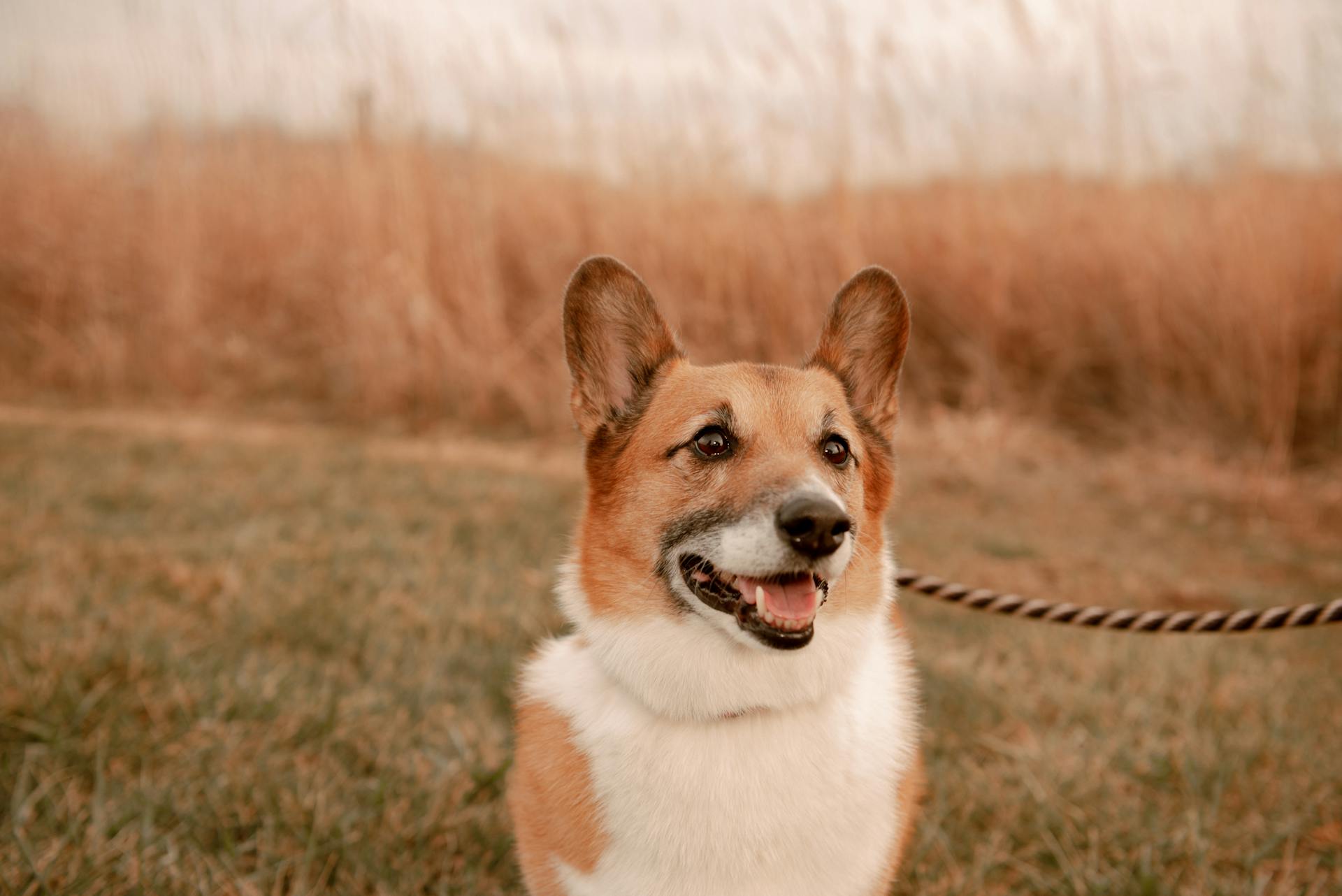
Cardigan Corgi puppies are a unique and lovable breed, but they do require some special care.
They need regular exercise to stay healthy and happy, so be prepared for daily walks and playtime.
Their short stature means they can be prone to obesity, so monitoring their food intake is crucial.
Cardigan Corgis are intelligent and trainable, but they can be stubborn at times, so patience and consistency are key.
Their coats require regular grooming to prevent matting and tangling, and they shed heavily, so be prepared for regular brushing sessions.
Cardigan Corgis are generally good with children, but as with any breed, socialization from an early age is essential to ensure they grow into well-adjusted adult dogs.
A different take: Why Are Corgis so Popular
Cardigan Corgi Characteristics
The Cardigan Welsh Corgi is known for its playful temperament and larger-than-life personality. This breed is naturally attentive, making them excellent watchdogs that alert their owners to any sign of trouble with a quick bark.
Their affection level is very high, so be prepared for plenty of snuggles and attention-seeking behavior. They're also extremely kid-friendly and pet-friendly, making them a great addition to families.
Here are some key characteristics to keep in mind:
Their trainability and intelligence make them relatively easy to train, but be aware that their tendency to bark can be a challenge, especially if you live in an apartment.
Health and Care
Cardigan corgi puppies are generally healthy, but like all breeds, they're prone to certain health conditions. You should expect to see health clearances from the Orthopedic Foundation for Animals (OFA) for hip dysplasia, certification from the Canine Eye Registry Foundation (CERF) that eyes are normal, and a DNA test for progressive retinal atrophy.
Cardigans are prone to ruptures in a spinal disc, known as Intervertebral Disk Disease, which can cause unsteadiness, difficulty going up or down stairs, and weakness. Early signs of Progressive Retinal Atrophy (PRA) include night-blindness, which can progress to loss of sight during the day.
For more insights, see: Cardigan Welsh Corgi Health Issues
To prevent back injuries, avoid letting puppies jump on and off furniture, and don't pick them up without supporting both the front legs and the rear end. Regular brushing can help maintain a Cardigan's coat health and appearance, prevent matting, and ensure they are comfortable and happy.
Here's a quick checklist to keep in mind:
- Check OFA website for hip dysplasia clearance
- Check CERF website for eye certification
- Get a DNA test for progressive retinal atrophy
- Avoid jumping on and off furniture
- Support front and rear legs when picking up
- Brush coat regularly to prevent matting
Pet Care
Cardigans need daily exercise, whether it's a walk or training for a dog sport like agility, to stay happy and healthy.
Their short legs and long back make them prone to back injuries, so it's essential to avoid letting them jump on and off furniture, and to pick them up carefully, supporting both their front and rear legs.
A Cardigan's weather-resistant coat doesn't mean they're an outside dog; they're highly people-oriented and need plenty of human interaction.
Cardigans are intelligent and eager to please, making them great family dogs with proper training and socialization.
A unique perspective: Straight Backed German Shepherds
Their adaptable nature and loyal companionship make them excellent companions for families who can provide the attention and exercise they need.
Cardigans need a consistent feeding schedule, eating at the same time every day, and should eat twice a day as adults, or more frequently as puppies.
With basic obedience training, moderate exercise, and standard grooming, Cardigans can thrive in a happy, well-adjusted life.
As a pet parent, providing ample love, attention, and mental stimulation is crucial for a Cardigan's happiness and well-being.
Intriguing read: Boston Terrier Day
Health
Cardigan Welsh Corgis are generally healthy dogs, but like all breeds, they can be prone to certain health issues. They can live to be 16 or 17 with proper care.
Their long backs make them susceptible to Intervertebral Disk Disease, which can cause unsteadiness, difficulty going up or down stairs, and paralysis. This condition can be prevented with regular exercise and a healthy diet.
Hip dysplasia is another common issue in Cardigans, caused by a malformation in the dog's joints. A score of fair or better from the Orthopedic Foundation for Animals (OFA) is a good indicator of a healthy hip.
Progressive Retinal Atrophy (PRA) is a degenerative eye disease that can cause blindness. Early signs include night-blindness, which can progress to complete loss of vision during the day.
If this caught your attention, see: Hip Problems in Border Collies
Grooming and Coat
Cardigan corgi puppies have a double coat that sheds heavily, especially during certain times of the year. This means you'll need to brush them frequently to keep flying hair under control.
Daily brushing is essential, especially during shedding season, when warm baths may also be necessary to remove excess coat. Brushing their teeth at least two or three times a week can help prevent tartar buildup and gum disease.
Trimming their nails once or twice a month is crucial to prevent painful tears and other problems. If you hear their nails clicking on the floor, it's time for a trim.
Regular ear checks are also important, as infections can occur if left untreated. Wipe their ears with a cotton ball and gentle ear cleaner to prevent infections.
Grooming should start early, with puppies getting accustomed to being brushed and examined from a young age. This will make future veterinary exams and handling much easier.
A different take: Dogs Breeds That Start with B
Their coats come in various colors, including red, sable, and brindle, with or without tan or brindle points. They often have white markings on their legs, chest, neck, muzzle, belly, and tail tip.
A weekly brush-out is essential to keep shedding to a minimum, and their coats repel dirt and water, requiring only occasional baths.
Training and Behavior
Cardigan corgi puppies are highly intelligent and eager to learn, making them responsive to training. They thrive with positive reinforcement training methods and mentally stimulating activities.
Cardigans are naturally curious, so training should engage their inquisitive nature as they learn new cues and tricks. With gentle, positive training methods, they'll quickly and happily learn good manners and house rules.
A 20-30 minute walk is a good starting point for daily exercise, but avoid strenuous activities. This will help prevent boredom and destructive behavior.
Cardigans can be prone to anxiety, especially when left alone for extended periods. Providing them with ample mental stimulation through training and puzzle toys can help curb this behavior.
Early training and socialization are crucial to direct their intelligence toward appropriate behavior. This will help them form strong bonds with their families and become well-adjusted adult dogs.
Cardigans may exhibit herding behaviors, such as attempting to round up young children or other pets. Providing them with ample mental stimulation and teaching them that some things are not appropriate to herd can help curb this behavior.
Barking is a common trait in Cardigans, which can be managed with training and awareness of their herding background.
Feeding and Nutrition
Cardigan Corgi puppies need a balanced diet to stay healthy and happy.
Feed your Cardigan Corgi puppy 1 to 1.5 cups of high-quality dry food daily, divided into two meals.
You should measure your puppy's food and feed them twice a day, rather than leaving food out all the time.
Cardigans like to eat and will over-indulge if given the chance, so it's essential to monitor their food intake.
Curious to learn more? Check out: Best Food for Rhodesian Ridgeback
Choose a dog food that lists high-quality protein sources, such as meat, as the primary ingredient.
The Association of American Feed Control Officials (AAFCO) can provide more information on the ingredients used in pet food.
Your vet can give you feeding instructions tailored to your puppy's specific needs.
You should look for AAFCO-approved dog food, which will provide feeding guidelines on the packaging.
Purchase easy-to-clean stainless steel or ceramic bowls for your puppy, as they are most suitable for Cardigan Welsh Corgis.
Avoid plastic bowls, as they can irritate your puppy's skin while eating.
A well-balanced, AAFCO-approved dog food should provide all the necessary nutrients for your Cardigan Corgi, but you may want to discuss supplements with your vet.
Check this out: Puppys Food
Family and Socialization
Cardigan Corgi puppies are perfect for families, singles, or seniors, as long as they receive daily exercise and playtime.
They love children, but their herding instincts can motivate them to nip at a youngster's feet or ankles. You should always supervise any interactions between dogs and young children to prevent any biting or ear or tail pulling.
Teach your child never to approach any dog while it's eating or sleeping or to try to take the dog's food away. This will help prevent any conflicts or accidents.
Cardigans are usually friendly toward other pets in the household, but they can be aggressive toward dogs that aren't part of their family. Introducing your puppy to other household members early can reduce the chances of conflict.
Early socialization is critical for Cardigan Corgis. You should introduce your Corgi to new people and experiences while young to ensure they stay adaptable and don't become fearful.
Cardigans can be protective over household members, but they are usually open to strangers. However, it's essential to teach them not to nip at people's feet or ankles, and to respect personal space.
Introducing your Corgi to other animals requires supervision, especially when they're young. This will help prevent any conflicts or chasing behaviors that come with their herding instincts.
Consider reading: Why Do People like Chihuahuas
Owning a Cardigan Corgi
Choosing the right breed is crucial, and Cardigan Corgis are an excellent choice for new pet owners. They are intelligent, eager to please, and make great family dogs when given proper training and socialization.
To find a responsible breeder, check with the Cardigan Welsh Corgi Club of America, which maintains a list of breeders on its website. Be prepared to wait if you want a puppy, as responsible breeders don't breed often.
The cost of a Cardigan Welsh Corgi typically ranges between $1,000 and $3,000, depending on pedigree and availability in your area.
Owning Essentials
Owning a Cardigan Corgi is a big responsibility, but it's also incredibly rewarding. You'll need to take your role seriously and provide them with all the basic necessities.
Cardigan Welsh Corgis are excellent family dogs, but they do need proper training and socialization. With the right care, they'll make great companions for families.
One of the best features of Cardigan Welsh Corgis is their low, sturdy build; fluffy, foxlike tail; and large, upright ears. These physical characteristics make them a unique and lovable breed.
Cardigans need a walk every day to stay happy and healthy. This is essential for their physical and mental well-being.
To prevent overfeeding, establish a consistent feeding schedule for your Cardigan, ensuring they eat at the same time every day. Adult Cardis should eat twice a day, while puppies need to eat more frequently, up to four times a day.
Intriguing read: List of All Hypoallergenic Dog Breeds
Adopt or Buy
If you're considering bringing a Cardigan Welsh Corgi into your family, you have two main options: adoption or buying from a breeder.
Adopting a Cardigan Welsh Corgi can be a rewarding experience, especially if you're looking for an adult dog. Many rescues have adult Cardigans available for adoption, and occasionally, litters of puppies may be available too.
To search for a Cardigan in need of rehoming, check with the Cardigan Welsh Corgi Club of America and your local shelters and rescue groups. You can also contact the Cardigan Welsh Corgi National Rescue Trust for assistance.
Broaden your view: Adult German Shepherds
If you prefer to buy a puppy, you can find a responsible breeder through the Cardigan Welsh Corgi Club of America's website. Be prepared to wait, as responsible breeders don't breed often and may not have puppies available all the time.
The cost of a Cardigan Welsh Corgi puppy can range from $1,000 to $3,000, depending on pedigree and availability in your area.
Here are some resources to help you get started:
- Cardigan Welsh Corgi Club of America
- Cardigan Welsh Corgi National Rescue Trust
- AKC Cardigan Welsh Corgi Breeders
Pet Parent Considerations
Owning a Cardigan Corgi requires serious consideration and preparation. You must take your role as a pet parent seriously and provide them with all the basic necessities, as mentioned in Example 2.
To create an ideal home for your Cardigan, provide ample love, attention, and mental stimulation. This intelligent breed thrives on companionship and requires daily exercise and playtime, as noted in Example 5.
A perfect home for a Cardigan Corgi should provide a comfortable living space and a loving environment. They are well-suited for families, singles, or seniors, but all household members must be prepared to provide attention and care.
To ensure your Cardigan gets along with other pets, introduce them early and supervise any contact between your Corgi and other animals. This breed has an instinct to chase smaller pets, but with proper introduction and supervision, conflicts can be minimized, as mentioned in Example 6.
Here's a summary of the essential considerations for pet parents:
- Provide ample love, attention, and mental stimulation
- Offer daily exercise and playtime
- Create a comfortable living space
- Introduce your Cardigan to other pets early and supervise interactions
By considering these factors and providing the necessary care, you can create a happy and healthy home for your Cardigan Corgi.
Frequently Asked Questions
Which Corgi is better Pembroke or Cardigan?
The Pembroke Corgi is generally more social and outgoing, while the Cardigan Corgi is more cautious and reserved. Both breeds make excellent watchdogs due to their alert and attentive nature.
Are Cardigan Corgis good dogs?
Cardigan Welsh Corgis are highly intelligent, friendly, and affectionate family pets that thrive on mental and physical stimulation. With proper training, they can make wonderful companions for active families.
How much does a Cardigan Welsh Corgi cost?
The cost of a Cardigan Welsh Corgi can range from $1,500 to $2,500 for a puppy from a reputable breeder, or less through adoption. Monthly expenses, including food, can add up to $20-$60.
Are Cardigan Welsh Corgis rare?
Cardigan Welsh Corgis are relatively rare, ranking around 90th among AKC breeds in the US. While not extremely rare, they are less common than many other popular breeds.
Why are Cardigan Corgis so rare?
Cardigan Corgis are a rare breed due to their historical isolation among old farmers and breeders, who selectively bred them for herding and companionship. This limited breeding has contributed to their relatively low population and rarity.
Featured Images: pexels.com


